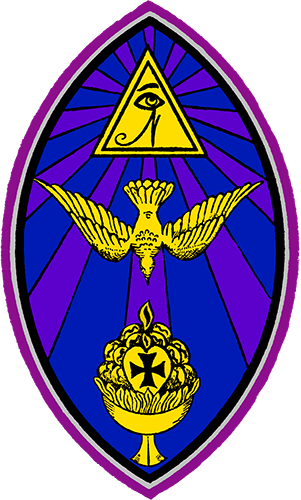
Ordo Templi Orientis
William E. Heidrick Memorial Library
VI
The Adept
I
|
Even as the holy Ra that travelleth Even as the holy hawk that towers sublime With infinite contempt the joyous world Master of self and God, freewill and Fate, |
II
|
Wrapped in the wool of wizardry I sit, These Gods and men, these laws, these hieroglyphs They reach me not; I made a monstrous crowd, Had not— Who sitteth on the Holy Throne |
III
|
See! to be God is to be lost to God. I conjure up dim gods; how frail and thin! I were a maniac did I contemplate For I am that I am— behold! this “I” |
IV
|
Should I take pleasure in the fond perfume And bulls and men send up a fragrant steam I have created men, who made them gods From all the thorny thoughts that plague them most; |
V
|
Yet I abide; for who is Pan is all. The pity and the terror and the yearning Brilliance that coruscates its jetted fire Before whose glance the ashen world grows grey, |
VI
|
As when the living eyes of man behold Yet inasmuch as life is life, they shrink, Swifter and deadlier than storms or snakes. O joy! O terror! O!— O can it be |
VII
|
I travelled; so the star. We neared; we saw What was the manner of our countenance? With glory, and your body bathed in glory, The authentic seal of our majestic might |
VIII
|
So presently, most solemnly and slowly, Unto the ends of our dead universe For now we knew: “It is a lonely thing Silence! Beware to speak the fatal word |
IX
|
Wherefore again in sexless sanctity Rather be Phoedra than Semiramis! Why should we cast our crowns to gods unborn? Not for a while evoke that sombre spell! |
X
|
That is his truth that seems to sink supine This is his truth, who seems to writhe and sob This is his truth, and yours, that seem to be And sexless mouthings, that repugnant roll |
XI
|
This is our truth, that only Nothing is, Loves are the letters of the holy word Kisses induct the soft and solemn tune That witches see, whose eager violence |
XII
|
The uninstructed and blaspheming man The love-taught magus, the hermaphrodite, I love, and you are wise; our spirits dance Tire? O thou sea of love, thy ripples run |
XIII
|
For you I built this faery dome of words The stars enfold it; the eternal sun I have begemmed its marble flame of spires Is there no window to the east? Behold |
XIV
|
For me therein shall you erect a statue Make me the aching mouth parched-up with blisses, Born in the utmost world where we in truth Of snaky lightnings, lest— but that shall be |
XV
|
Or, an you will, evoke me as the Sphinx Rises above the utmost brim of thought The whole content of our imagining, —Now our affairs are ordered perfectly, |
Notes
I. 1. |
Ra.— The “Sun-God.” | |
I. 5. |
Horus.— The hawk, also a “Sun-God.” | |
II. 1. |
Apollonius of Tyana, the notorious pseudo-Christ, used to cover himself in wool in order to meditate. | |
III. 7. |
Fellatrix.— Only a Latin dictionary can unveil the loathsome horror of this filthy word. | |
IV. q sqq. |
—Impossible to comment on this shocking “sin against the Holy Ghost.” To compare the very Spirit or Breath of God to—! Oh, Lord, how long? | |
VI. 11. |
Basilisk.— a fabulous creature that slew all that it looked upon. | |
IX. 1. |
Lingam.— The Hindu God (!)— the male organ of generation. | |
2. |
Yoni.— Its feminine equivalent. That the poor Hindus should worship these shameful things! And we? Oh how poor and inadequate is all our missionary effort! Let us send out more, and yet more, to our perishing brothers! | |
5. |
Phædra was repulsed by her son Hippolytus; Semiramis received the willing embraces of her son Ninus. | |
XI. 1. |
Only Nothing is.— There is much metaphysical nonsense culled from German Atheistic philosophy, in these poems. A wicked philosopher is far more dangerous than a mere voluptuary. | |
10. |
Doomisday.— An affected archaism for the Day of Judgment. How can the writer dare to speak of this great day, on which he shall be damned for ever? “For he that believeth not is condemned already.” | |
XII. 6. |
Mother.— Nature. How true would be these lines, if only for “the love-taught magus, the hermaphrodite” with all its superstition, blasphemy, and obscenity, one were to write “The Christ-saved sinner, brought into the light.” | |
XV. 10. |
The arcanum in the adytum.— More classical affectation for “the secret thing in the holy place.” |